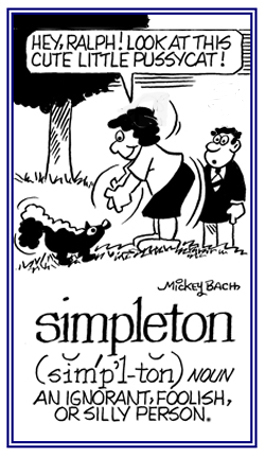simal-, simil-, simul-, -semble
(Latin: same, like, alike; same time; to appear, to seem; together)
fax (verb), faxes; faxed; faxing
1. To produce exact reproductions, as of documents.
2. To send a message or document via a special machine or method on the internet.
2. To send a message or document via a special machine or method on the internet.
In medicine, the imperfect absorption of nutriments into the body system: Karen's doctor indicated that her loss of weight and weakness was a result of malassimilation and efforts were being made to find a medical solution.
The extent to which someone, or something, looks like another person or something else.
resemble (verb), resembles; resembled; resembling
similar (adjective), more similar, most similar
1. The sharing of some qualities, but which are not identical: "They had similar experiences growing up, even though the came from completely different backgrounds."
2. Related in appearance or nature and although they are alike, they are not identical: "Their cats are similar in size and color."
3. In mathematics, a reference to elements with the same shape or angles; such as, geometric figures that differ in size or proportion but not in shape or angular measurements.
2. Related in appearance or nature and although they are alike, they are not identical: "Their cats are similar in size and color."
3. In mathematics, a reference to elements with the same shape or angles; such as, geometric figures that differ in size or proportion but not in shape or angular measurements.
A quality which makes one person or thing like another one: "The two books share a similarity of ideas; in fact, Ira sees many similarities in them."
similarly (adverb), more similarly, most similarly
1. In almost the same way: "Her friend and she were similarly affected by the new tax laws."
2. A descriptive term that says that two situations, actions, statements, etc. are alike: "Similarly, there will still be some people who prefer to shoot pictures on film even after digital cameras become the norm for almost everyone else."
2. A descriptive term that says that two situations, actions, statements, etc. are alike: "Similarly, there will still be some people who prefer to shoot pictures on film even after digital cameras become the norm for almost everyone else."
1. A figure of speech in which two essentially unlike things are compared, often in a phrase introduced by like or as.
2. A figure of speech that expresses a resemblance between things of different kinds.
2. A figure of speech that expresses a resemblance between things of different kinds.
Similia similibus curantur. (Latin motto)
Translation: "Like things are cured by likes"; or, "Similar ailments are treated successfully by similar remedies."
"Fight fire with fire." An example of this philosophy may be seen in the doctrine of homeopathy which advocates treatment of a disease by giving the sick person small amounts of substances that would produce symptoms of the same disease if they were given to a healthy person.
An opposite belief may be seen in Contraria contrariis curantur, or "Opposites are cured by opposites."
simple (adjective), more simple, most simple
1. A foolish or gullible person who is lacking common sense: If someone is called a simpleton, it usually means that he or she is easily deceived or not very intelligent.

© ALL rights are reserved.
Go to this Word A Day Revisited Index
Anyone who believes what most politicians say is a simpleton.
2. Etymology: from Latin simplex, "simple", literally "one fold", from sim-,"the same" + plicare, "to fold".
Go to this Word A Day Revisited Index
so you can see more of Mickey Bach's cartoons.
simplified (adjective), more simplified, most simplified
A reference to making something easier or uncomplicated and therefore easier to do or to understand: "Sharon developed a simplified presentation of vocabulary words."
"The teacher was asked if he could explain the math problem in more simplified terms."
simplify (verb), simplifies; simplified; simplifying
1. To make something easier to do or to understand: "The new software for the computer should simplify the process of creating new programs."
2. To reduce in complexity or extent: "Some people believe that microwave ovens have simplified cooking."
2. To reduce in complexity or extent: "Some people believe that microwave ovens have simplified cooking."


